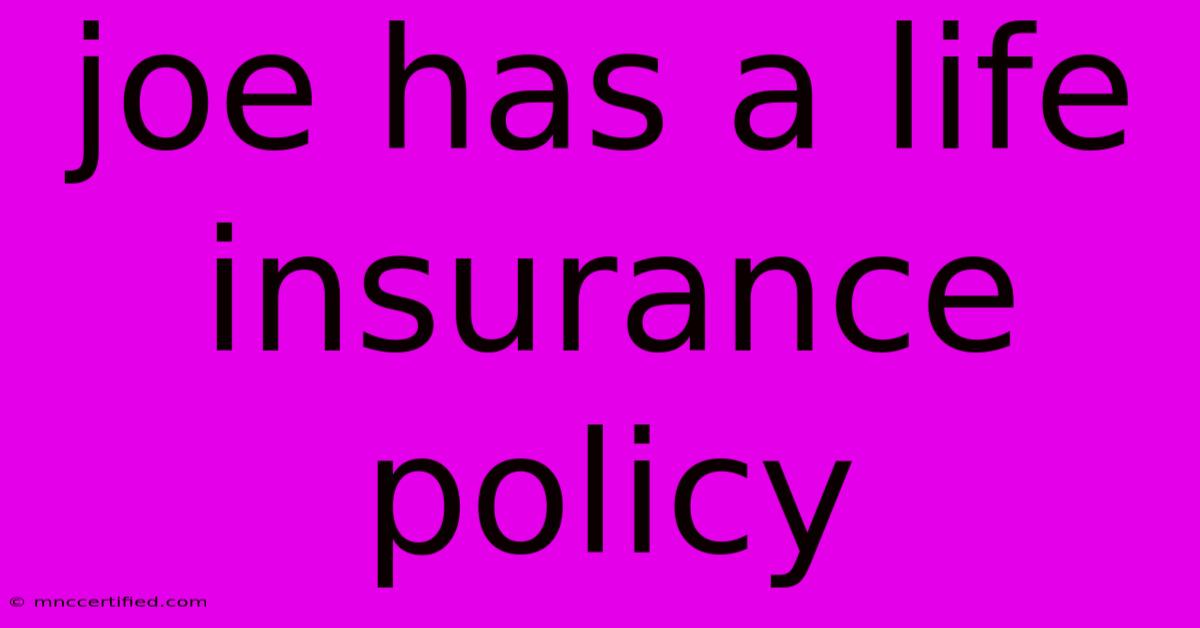Joe Has A Life Insurance Policy

Table of Contents
Joe Has a Life Insurance Policy: Understanding the Implications
Joe has a life insurance policy. This seemingly simple statement opens up a world of possibilities and considerations, depending on the specifics of the policy. This article will explore the various implications of Joe owning life insurance, from the benefits and responsibilities to the different types of policies available. Understanding these aspects is crucial for anyone, whether they are Joe himself, a beneficiary, or simply interested in learning about life insurance.
The Benefits of Joe's Life Insurance Policy
The primary benefit of life insurance is the death benefit. This is the sum of money paid out to the designated beneficiary upon Joe's death. This benefit can provide crucial financial security for Joe's loved ones, covering expenses such as:
- Funeral costs: These can be surprisingly high, and life insurance can alleviate the financial burden on the family.
- Outstanding debts: Mortgages, loans, and credit card debts can be paid off, preventing further financial strain.
- Income replacement: The death benefit can replace Joe's lost income, allowing his family to maintain their living standard.
- Children's education: Life insurance can fund college education for Joe's children, securing their future.
- Estate planning: It can help cover estate taxes and ensure a smoother transition of assets.
Beyond the death benefit, some life insurance policies offer cash value accumulation, allowing Joe to build savings over time. This can be particularly beneficial for long-term financial planning and retirement. This is a feature usually found in permanent life insurance policies, such as whole life or universal life policies.
Types of Life Insurance Policies Joe Might Have
The implications of Joe's life insurance policy significantly depend on the type of policy he holds. Common types include:
-
Term Life Insurance: This offers coverage for a specific period (term), typically 10, 20, or 30 years. It's generally more affordable than permanent insurance but provides no cash value accumulation. If Joe dies within the term, the beneficiary receives the death benefit. If he survives the term, the policy expires. This is often a good option for those needing coverage for a specific period, like paying off a mortgage.
-
Whole Life Insurance: This offers lifelong coverage and builds cash value that grows tax-deferred. It's more expensive than term life insurance but offers a stable, long-term investment aspect. The cash value can be borrowed against or withdrawn, making it a versatile financial tool.
-
Universal Life Insurance: This is a flexible permanent life insurance policy that allows adjustments to premiums and death benefits. It also builds cash value, but the growth rate is variable, depending on market performance.
-
Variable Life Insurance: This type of permanent life insurance allows the policyholder to invest the cash value in different sub-accounts, offering the potential for higher returns but also increased risk.
Understanding the Policy Details: Beneficiaries and Riders
To fully grasp the implications of Joe's life insurance policy, understanding the beneficiary designation and any added riders is crucial.
-
Beneficiary: This is the person or entity who will receive the death benefit. It's crucial to ensure the beneficiary information is up-to-date and accurately reflects Joe's wishes.
-
Riders: These are added features that enhance the policy's coverage, such as accidental death benefits, critical illness riders, or long-term care riders. These can significantly impact the overall value and implications of the policy.
Potential Tax Implications for Joe and his Beneficiary
The tax implications of life insurance can be complex. Generally, the death benefit is received income-tax-free by the beneficiary. However, there can be exceptions, especially if the policy's cash value was borrowed against extensively. It's advisable for both Joe and his beneficiary to consult with a financial advisor or tax professional to fully understand the tax implications.
Conclusion: The Importance of Professional Advice
Owning a life insurance policy is a significant financial decision. While this article provides a general overview of the implications of Joe having life insurance, it's crucial to remember that every situation is unique. To ensure you fully understand your rights and responsibilities regarding a life insurance policy, consulting with a qualified financial advisor is strongly recommended. They can help navigate the complexities of different policy types and ensure the policy aligns with your specific financial goals and circumstances. This is especially true for those who are considering purchasing life insurance for the first time or who need to review their existing coverage.

Thank you for visiting our website wich cover about Joe Has A Life Insurance Policy. We hope the information provided has been useful to you. Feel free to contact us if you have any questions or need further assistance. See you next time and dont miss to bookmark.
Featured Posts
-
Alarm Certificate For Insurance
Nov 23, 2024
-
What Insurance Does Bronson Accept
Nov 23, 2024
-
Cynthia Erivos Wicked Part One
Nov 23, 2024
-
Builders Risk Insurance Georgia
Nov 23, 2024
-
Chester City Centre Bomb Scare Update
Nov 23, 2024